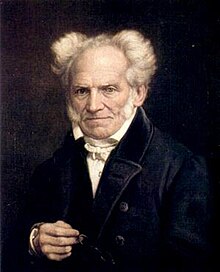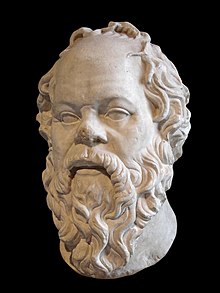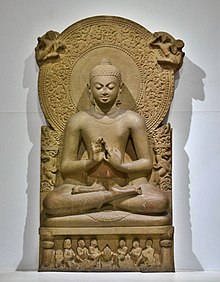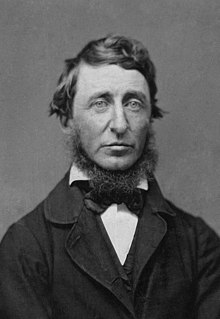
Philosophers of love
Socrates (Greek: Σωκράτης; c. 470–399 BC) was a Greek philosopher from Athens who is credited as the founder of Western philosophy and among the first moral philosophers of the ethical tradition of thought. An enigmatic figure, Socrates authored no texts and is known mainly through the posthumous accounts of classical writers, particularly his students Plato and Xenophon.
8 episodes
Episodes in this category also belong to the following categories:
Bertrand Russell
Melvyn Bragg and his guests discuss the influential 20th-century British thinker Bertrand Russell, widely regarded as one of the founders of Analytical philosophy.
6 December 2012
Featuring: A. C. Grayling, Mike Beaney, Hilary Greaves
PhilosophyNobel laureates in LiteratureBritish philosophers of languageGeorgistsEnglish political writersFree love advocatesSet theoristsAristotelian philosophersWriters about religion and scienceJerusalem Prize recipientsFellows of Trinity College, CambridgeEnglish logiciansPhilosophers of mathematicsBritish historians of philosophyEmpiricistsOntologistsMetaphysics writersBritish political philosophersFellows of the Royal SocietyMetaphilosophersTheorists on Western civilizationBritish ethicistsPhilosophers of literatureBritish free speech activists20th-century English philosophersAnalytic philosophersEnglish humanistsRhetoric theoristsAtheist philosophersEnglish political philosophersEnglish anti-fascistsEnglish people of Scottish descentPhilosophers of historyEnglish agnostics20th-century atheistsConsequentialistsEnglish socialistsPhilosophers of social scienceBritish philosophers of religionPresidents of the Aristotelian SocietyLogiciansPhilosophers of lawPhilosophers of sexuality19th-century English mathematiciansCritics of work and the work ethicSecular humanistsPhilosophers of technologyPhilosophers of economicsWriters about globalizationBritish philosophers of educationBritish philosophers of culture, English pacifistsBritish philosophers of logicCritics of the Catholic ChurchPeople from MonmouthshireAlumni of Trinity College, CambridgeLinguistic turnPhilosophers of loveEuropean democratic socialistsBritish consciousness researchers and theoristsWriters about activism and social changeEnglish Nobel laureatesMembers of the Order of MeritEnglish prisoners and detaineesUtilitariansIntellectual historians, University of Chicago facultyEnglish scepticsBritish critics of ChristianityEnglish people of Welsh descentUniversal basic income writersBritish philosophers of mind19th-century English philosophersBritish critics of religionsAcademics of the London School of Economics, British philosophers of science19th-century atheistsUniversity of California, Los Angeles facultyAnti-nationalists20th-century English mathematiciansEnglish essayistsFreethought writersBritish atheism activistsWriters about communism19th-century English essayistsEnglish male non-fiction writersKierkegaard
Melvyn Bragg and guests discuss the rich and radical ideas of Soren Kierkegaard, often called the father of Existentialism.
20 March 2008
Featuring: Jonathan Rée, Clare Carlisle, John Lippitt
PhilosophyEpistemologists19th-century essayistsChristian humanistsUniversity of Copenhagen alumniMetaphilosophersExistentialistsPhilosophers of deathPhilosophers of literatureExistentialist theologians19th-century male writersChristian poetsSocial philosophersPhilosophy writersAphoristsChristian ethicistsIrony theoristsPhilosophers of culturePeople celebrated in the Lutheran liturgical calendarPhilosophers of psychologyPhilosophers of artChristian radicalsOntologistsPhilosophers of lovePhilosophers of mindMetaphysicians19th-century pseudonymous writers19th-century deaths from tuberculosisPhilosophers of religionPhilippa Foot
Melvyn Bragg and guests discuss one of the most notable philosophers of the 20th century, who explored why it mattered to be moral and why humans needed virtues to flourish.
16 May 2024
Featuring: Anil Gomes, Sophie Grace Chappell, Rachael Wiseman
PhilosophyUniversity of California, Los Angeles facultyEnglish atheistsFellows of the British AcademyVirtue ethicists20th-century English philosophersAlumni of Somerville College, OxfordAnalytic philosophersPhilosophy writersAristotelian philosophersFellows of Somerville College, OxfordEnglish women philosophersBritish atheistsAtheist philosophersPhilosophers of loveMoral realistsWittgensteinian philosophersPlato's Gorgias
Melvyn Bragg and guests discuss arguably the most personal of Plato's dialogues in which he examines the values that led to the execution of his mentor Socrates by drinking hemlock
25 November 2021
Featuring: Angie Hobbs, Frisbee Sheffield, Fiona Leigh
PhilosophyNatural law ethicistsPlatonismAncient Greek slaves and freedmenPhilosophers of deathTheorists on Western civilizationAncient Greek physicistsMoral realistsLogiciansAncient Greek epistemologists, Ancient Greek ethicistsRationalistsEpigrammatists of the Greek AnthologyPupils of SocratesPhilosophers of educationAncient Greek philosophers of mindOntologistsPhilosophers of loveClassical theismAttic Greek writersAncient Greek logiciansAncient Greek political philosophersIdealistsNatural philosophersAncient Greek metaphysiciansAncient Athenian philosophersSchopenhauer
Melvyn Bragg and guests discuss the pessimistic philosophy of Arthur Schopenhauer and his extraordinary influence.
29 October 2009
Featuring: A. C. Grayling, Beatrice Han-Pile, Christopher Janaway
PhilosophyGerman philosophers of artGerman philosophers of scienceGerman political philosophers19th-century German writersMetaphilosophersGerman eugenicists19th-century German philosophersTheorists on Western civilizationSimple living advocatesPhilosophers of literatureGerman idealistsPhilosophers of logicLogiciansPhenomenologistsPhilosophy writersCritical theoristsGerman philosophers of mind, German philosophers of religionAcademic staff of the Humboldt University of Berlin19th-century German male writersAphoristsGerman philosophers of languagePhilosophers of psychologyUniversity of Göttingen alumniGerman critics of ChristianityGerman philologistsGerman philosophers of culture19th-century German essayists19th-century atheistsCritics of religionsAtheist philosophersGerman male essayistsCritics of JudaismOntologistsPhilosophers of loveGerman writers on atheismGerman ethicists, German philosophers of educationGerman monarchistsPhilosophers of pessimismGerman epistemologistsAnti-natalistsGerman philosophers of historyGerman male non-fiction writersGerman logicians, Kantian philosophersSocrates
Melvyn Bragg and guests discuss the iconic Greek philosopher Socrates. He is the founder of Western philosophy, he was funny, irritating and rude but left not a single word in his own hand.
27 September 2007
Featuring: Angie Hobbs, David Sedley, Paul Millett
PhilosophyAncient Greek political philosophersPhilosophers of educationAncient Greek epistemologists, Ancient Greek ethicistsForced suicidesIrony theorists470s BC birthsExecuted philosophersAncient Greek philosophers of mindCritics of religions5th-century BC AtheniansAncient Athenian philosophersSocratesPhilosophers of love5th-century BC Greek philosophersClassical theismThe Buddha
Melvyn Bragg discusses the life of Siddhartha Gautama, the originator of Buddhism, and examines why his teachings have now become one of the fastest growing religions of the Western world.
14 March 2002
Featuring: Peter Harvey, Kate Crosby, Mahinda Deegalle
Thoreau and the American Idyll
Melvyn Bragg and guests discuss the American 19th century writer and philosopher, Henry David Thoreau
15 January 2009
Featuring: Kathleen Burk, Tim Morris, Stephen Fender
Philosophy19th-century American philosophersAmerican male essayists, American male poetsAmerican philosophers of mind, American philosophers of scienceAmerican spiritual writers19th-century American essayistsAmerican male non-fiction writersUnderground Railroad peopleCritics of work and the work ethicAmerican political philosophersAmerican lecturersAmerican philosophers of cultureHall of Fame for Great Americans inducteesAnti-consumeristsPhilosophers of lovePhilosophers from Massachusetts19th-century deaths from tuberculosis19th-century American poetsPantheists19th-century American non-fiction writersAnarchist writersPhilosophers of historySimple living advocates







